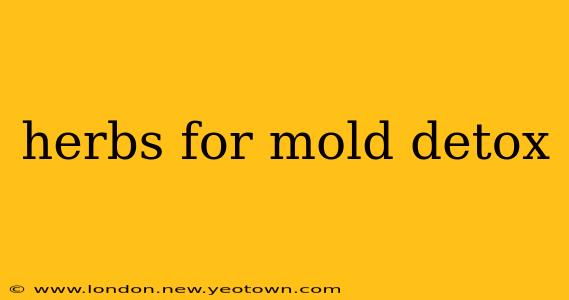Mold exposure can leave you feeling unwell, triggering a cascade of symptoms that range from mild allergies to serious health problems. While medical advice is crucial for managing mold-related illnesses, many are exploring natural ways to support their body's detoxification processes. This is where the fascinating world of herbal remedies comes into play. Let's delve into the potential benefits of certain herbs often associated with mold detoxification, remembering always that this information is for educational purposes and shouldn't replace professional medical guidance.
What are the best herbs for mold detox?
Several herbs have garnered attention for their potential to aid the body's natural detoxification pathways, potentially supporting recovery from mold exposure. It's important to understand that these herbs aren't a cure for mold illness, but rather may offer supplementary support. Always consult a healthcare professional before using herbs, especially if you have pre-existing health conditions or are taking other medications.
Among the herbs frequently mentioned in discussions about mold detoxification are:
-
Milk Thistle: This ancient herb boasts silymarin, a powerful antioxidant known for its liver-protective properties. The liver plays a crucial role in filtering toxins, and supporting its function is key to overall detoxification. Many believe Milk Thistle helps the liver process and eliminate mycotoxins, the toxic substances produced by mold.
-
Burdock Root: This root is a traditional remedy celebrated for its blood-cleansing properties. It's thought to assist the body in removing toxins from the bloodstream, which can be vital when dealing with mold exposure.
-
Dandelion Root: Another well-known detoxifying herb, Dandelion root is a gentle diuretic, helping to flush out toxins through the urinary system. It's rich in nutrients that support overall health and well-being, potentially boosting the body's resilience during detoxification.
-
Activated Charcoal: Although technically not an herb, activated charcoal is frequently included in discussions surrounding mold detoxification. Its high porosity allows it to bind to toxins in the digestive tract, potentially helping to remove them from the body. However, it's crucial to follow instructions carefully, as improper use can have adverse effects.
How do herbs help with mold toxicity?
The mechanisms through which these herbs might support mold detoxification are varied and often complex. However, some common themes emerge:
-
Supporting Liver Function: Many of these herbs, like Milk Thistle, help support and protect the liver, the body's primary detoxification organ. A healthy liver is better equipped to process and eliminate mycotoxins.
-
Promoting Elimination: Herbs like Dandelion root aid in eliminating toxins through urine, while others may promote bowel movements, facilitating the removal of toxins through the stool.
-
Antioxidant Properties: Many of these herbs are rich in antioxidants, which help combat oxidative stress caused by mycotoxins. Oxidative stress can damage cells and contribute to inflammation.
What are the potential side effects of using herbs for mold detox?
While generally considered safe when used appropriately, herbal remedies can have side effects. It's vital to:
-
Consult a healthcare professional: Discuss your intentions to use herbs for mold detoxification with your doctor, especially if you have pre-existing conditions.
-
Start with low doses: Begin with smaller amounts to assess your body's reaction before increasing the dosage.
-
Be aware of potential interactions: Some herbs can interact with medications. Disclose all medications and supplements you are taking to your doctor.
Are there any specific herbs to avoid while detoxing from mold?
There isn't a definitive list of herbs to strictly avoid during mold detoxification. However, it's crucial to consult a healthcare professional before using any herbal remedy, particularly if you have allergies or sensitivities. Some herbs might exacerbate existing conditions, so individual assessment is vital.
What else can I do to support my body during mold detoxification?
Beyond herbs, various strategies can support your body's detoxification process after mold exposure. These include:
-
Improving Gut Health: A healthy gut microbiome plays a critical role in overall detoxification. Focus on consuming prebiotic and probiotic-rich foods.
-
Hydration: Drinking plenty of clean water helps flush toxins from the system.
-
Nutrient-Rich Diet: Consume a balanced diet rich in fruits, vegetables, and whole grains to provide your body with the essential nutrients it needs for detoxification.
-
Reducing Mold Exposure: Minimize your exposure to mold as much as possible by addressing potential sources in your home or environment.
Remember: This information is for educational purposes only and should not be considered medical advice. Always consult with a healthcare professional before starting any herbal remedy, especially when dealing with mold-related illness. Their guidance is crucial in determining the best course of action for your specific situation.

